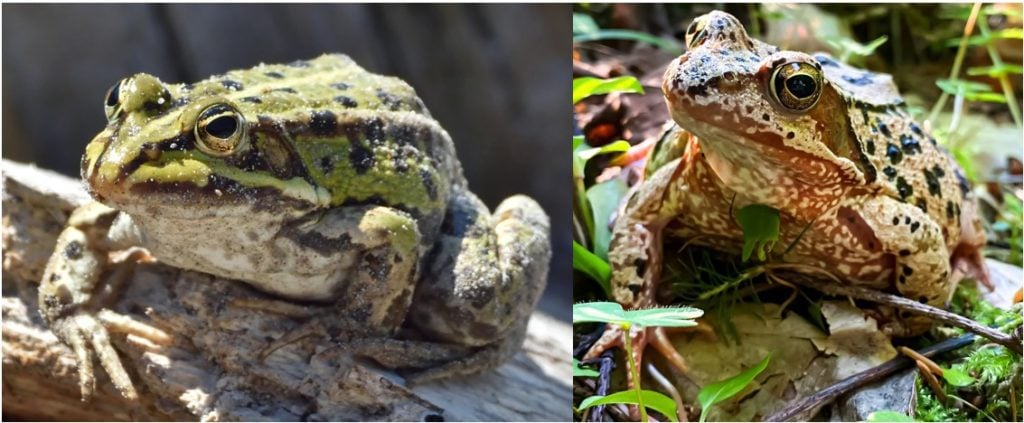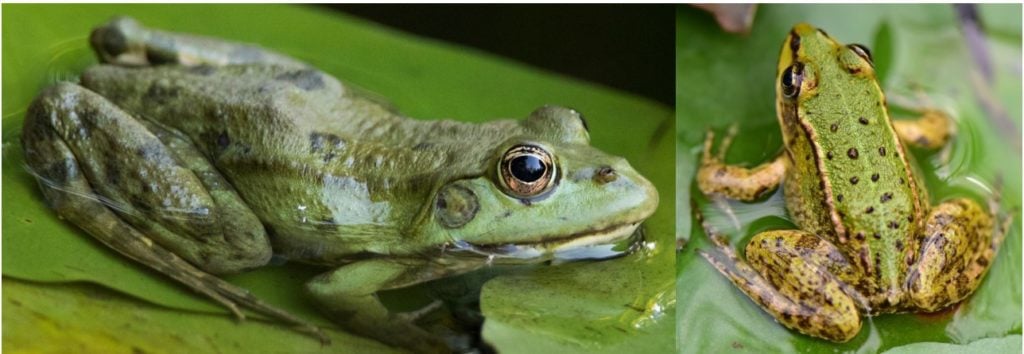6 Types of FROGS Found in Romania! (w/Pics)
Do you want to learn about the different frogs in Romania?

If so, you’ve come to the right place! In the article below, I have listed the frogs you can expect to see. For each species, you’ll find out how to identify that frog correctly, along with pictures, interesting facts, and RANGE MAPS!
6 types of frogs that live in Romania:
#1. Common Frog
- Rana temporaria

Identifying Characteristics:
- Adults grow up to 11 cm long.
- They have a short, blunt snout and partially webbed feet.
- Their coloring varies, from nearly black to pale brown, sometimes red or yellowish. The most typical markings are a white upper lip and a dark patch behind the eye.
The Common Frog is the most widespread frog in Romania.
It lives in nearly every habitat with stagnant water, including ponds, ditches, flooded meadows, and swamps. So if you have a pond in your garden, this species is most likely using it.
Common Frogs breed explosively, meaning that hundreds of these frogs gather together and breed simultaneously. As a result, it’s not uncommon to see the bottom of entire ponds covered in frog eggs during the breeding season.
Their unusual breeding strategy means young frogs emerge in unbelievable numbers during late summer. However, some late-hatching tadpoles hibernate over winter and emerge the following spring instead.
#2. Agile Frog
- Rana dalmatina

Identifying Characteristics:
- Adults are 8 cm long.
- This species has a slender body and long legs.
- Coloring is light brown above, with pale cream to white on the belly. The legs are banded with dark brown or black, and they have a black patch behind the eye.
The Agile Frog is one species that has EARNED its common name. This large, light-colored frog can leap incredible distances when disturbed. It’s known to cover up to two meters in a single bound!
Look for Agile Frogs in Romania on land near ditches, ponds, and flooded meadows. They are active day and night and spend most of their time hunting for beetles, their main food source.
To recognize this species’ distinct call, listen for a five- to ten-second, high-pitched cry. It often calls in a series, with each note becoming longer, higher-pitched, and further spaced.

#3. Pool Frog
- Pelophylax lessonae

Identifying Characteristics:
- Adults grow up to 8 cm long.
- This medium-sized species has large eyes, long toes, and three ridges along the back from the head to the legs.
- Its coloring is green on the head and body, brown on the legs, with dark splotches roughly arranged in stripes.
Pool Frogs are named for their preference for very small bodies of water. Although they’re found in ponds, you’ll have more luck looking for this species in flooded ditches, collections of rainwater, and even wheel ruts on dirt roads.

This aquatic species is active at night and during the day, and it loves the sun and spends much of its time out in the open. They forage after sunset when insects come out. Pool Frogs typically hibernate on land during cold weather. However, some individuals spend the winter underwater.
The Pool Frog has a very distinctive call that lasts for several seconds. It’s a loud rattling noise that alternates with a flat rasping. They also make a short squeaking noise to advertise their territory.
#4. Edible Frog
- Pelophylax kl. esculentus

Identifying Characteristics:
- Adults grow up to 10 cm long.
- This large species has protruding eyes, long toes, and a long, pointed snout.
- Its coloring is green on the body and legs, with dark splotches roughly arranged in stripes. Its belly is pale.
The Edible Frog has the most fascinating origin of any frog in Romania.
Although the process is much more complex, in short, this species is the result of a hybrid between two frog species that then uses cloning to reproduce!

I know this seems like science fiction! The fertile female offspring of a Pool Frog and a Marsh Frog can reproduce without using any of the breeding male’s genetic material. So, in essence, she produces clones of herself with the same DNA. Click here to read more about this interesting process called Gynogenesis.
As you may have guessed by its name, this frog is the one used to make the French delicacy of frog legs. Personally, I prefer to observe them in the wild rather than in a kitchen. 🙂
#5. Marsh Frog
- Pelophylax ridibundus

Identifying Characteristics:
- Adults grow up to 15 cm long.
- They have a pointed snout, robust body, and long, powerful legs.
- This species’ coloring is dark green to olive, fading to brown on the sides and legs.
- They have black blotches across the body, which form bands on the hind legs.
Look for Marsh Frogs in Romania in deep ponds, lakes, and larger rivers.
These large, loud frogs are hard to miss!
Although you shouldn’t have trouble spotting a Marsh Frog, you might have a harder time identifying one. This is because it’s often confused with its close relatives, the Graf’s Hybrid Frog and the Iberian Water Frog. The Marsh Frog is the largest of the three, but the best way to differentiate these species is by your location.
You can also listen for the Marsh Frog’s distinctive voice, a series of evenly spaced metallic squeaks.

#6. Eastern Tree Frog
- Hyla orientalis

Identifying Characteristics:
- Adults are about 5 cm long.
- This species has very long, thin legs. Its toes are long with little webbing, and its horizontal pupils are set in golden brown eyes.
- The most typical coloring is a bright grassy green, but some individuals are brownish or gray.
The Eastern Tree Frog has an interesting talent; it’s a bit of a meteorologist! Believe it or not, these bright green frogs were once used to determine if it was going to rain. They often croak loudly when storms draw near because they can sense the change in air pressure.

There are only a few species of tree frog in Europe.
Unfortunately, it can be hard to tell them apart because they all look similar. The best way to tell them apart is by location.
You can identify it by its bright green coloring or listen for its metallic, high-pitched croaks. This little frog is so loud it can be heard from as far away as a kilometer or more!

If you need additional help identifying frogs in Romania, check out this field guide!

Do you want to learn more about animals in Romania?
Check out these other ID Guides!
- The 30 MOST Common Birds Found in Romania!
- The 10 Types of Snakes That Live in Romania! (ID Guide)
- 39 Amazing ANIMALS to see in Romania! (ID guide w/ pics)
- The Incredible LIZARDS that live in Romania
Which of these frogs have you seen before in Romania?
Leave a COMMENT below!




